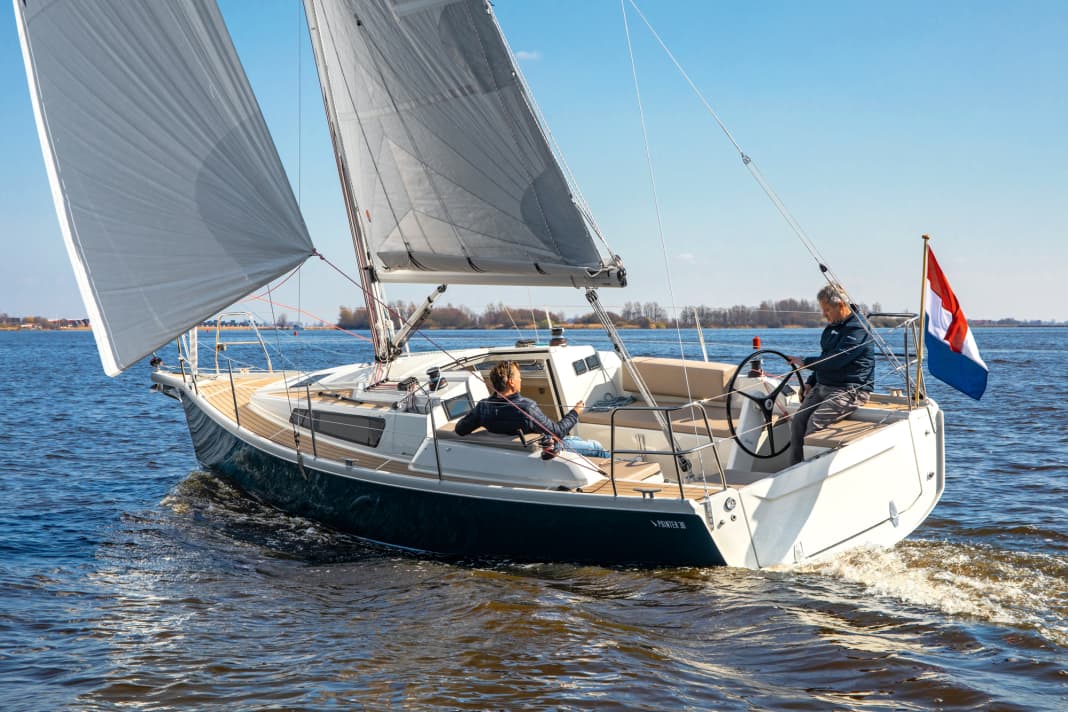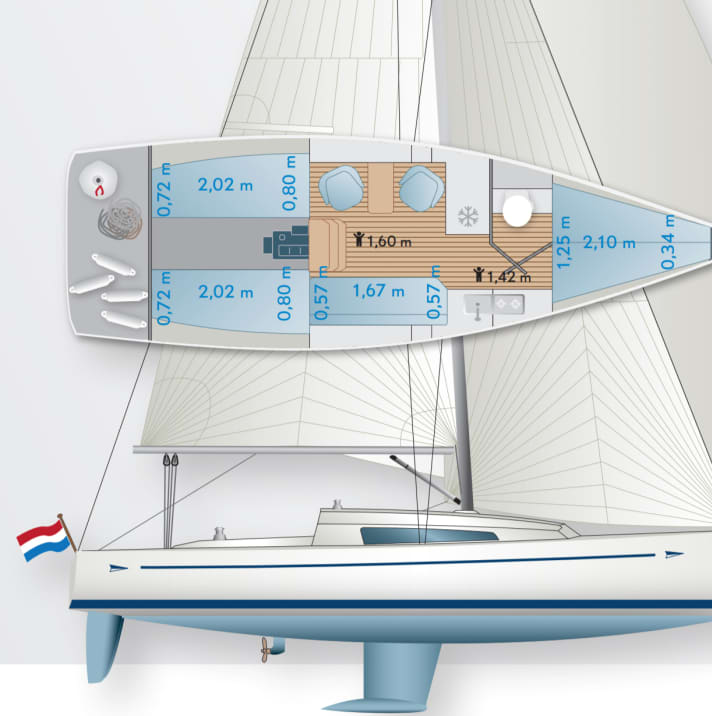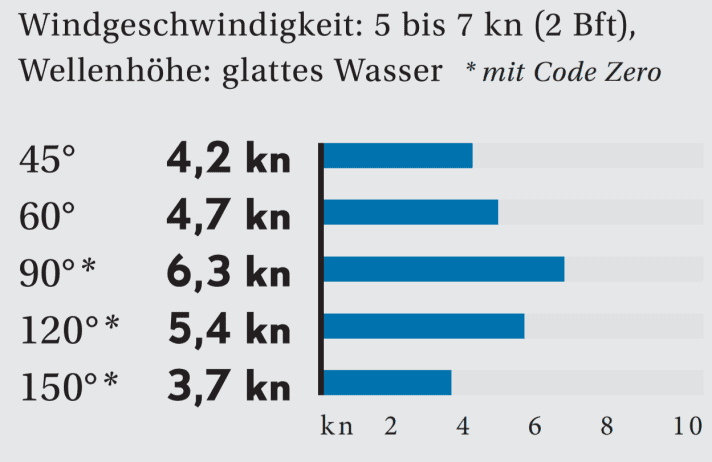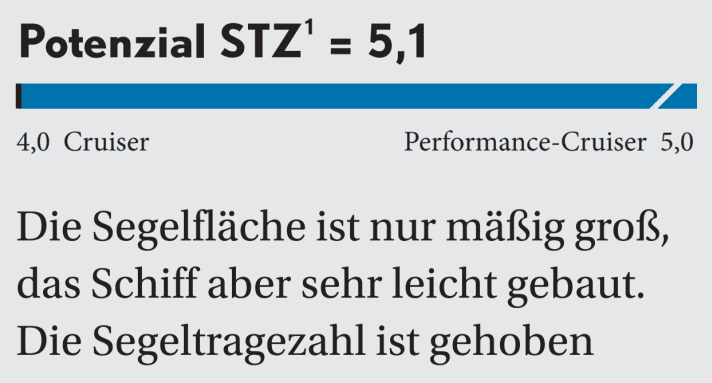





In this article:
The idea is promising and should have a good chance on the market: Create a boat that can be a cosy daysailer, a comfortable touring boat and a regatta-capable sports boat. However, it is difficult to find a good and harmonious middle ground between the genres. Many manufacturers have cut their teeth trying to place new products and fresh concepts in this coveted intersection. The smaller the boat, the more difficult the challenging task for planners and designers. It's all about the little things, about shapes and dimensions, about centimetres and millimetres that benefit comfort on board but are detrimental to performance under sail - or vice versa.
The Pointer 30 from Jachtwerf Heeg in Holland is the latest representative of the market for universal all-rounders with a hull length of around nine metres. Almost ten years ago, shipyard boss Geert Wijma started the crossover project Pointer 25 launched the new brand and shortly afterwards added the trailerable Pointer 22 has been added. With the new 30 series, the company is now completing the logical and expected upward expansion of the line.
A design with recognition value
Designer Peter Bosgraaf in Medemblik has revised and optimised the design by Geert Wijma. The features of the design are a relatively low freeboard, the harmonious and attractive deck step with a clearly raised stem and an elongated cabin superstructure. Overall, the Pointer 30 is an attractive and pleasing boat. The pronounced chine edges in the rear hull area and the rather bulky-looking stern with the folded-up bathing platform contribute to its individual appearance.
As standard, the Pointer 30 is built with a comparatively short L-shaped keel, a draught of just 1.25 metres and two rudder blades. In this way, the yacht builders in Friesland are primarily meeting the demand for boats for the predominantly shallow inland waters there. And with its short keel and a hull width of just 2.90 metres, the Pointer 30 can also be easily transported on a trailer, even without a special permit. A longer keel with a draught of 1.75 metres is available as an option. In this case, the customer can choose between one or two rudder blades. Flexible hull attachments, such as a lifting keel or a swivelling keel, are not provided.
The boats in the Pointer series are built from A to Z in the shipyard in Heeg, as GRP sandwich constructions in hand lay-up. The company uses osmosis-resistant vinyl ester resin for the hull. In the area of the keel flange, the hull is also reinforced with stainless steel profiles as floor beams, which are glued in and laminated over. Additional structural reinforcement is provided by a very extensive, continuous inner shell, in which the furniture foundations and the berth bearings are also integrated. The inside of the coachroof is suspended using a second large inner shell.
E-drive or diesel engine
Despite the relatively complex design and a ballast content in the short keel of an impressive 40 per cent, the Pointer 30 remains relatively light compared to the competition. Ready to sail, the boat weighs just 2.4 tonnes. However, the weight specification does not include the motorisation. The yacht can be equipped with either an electric pod drive from Torqeedo or a built-in diesel engine from Yanmar with 15 hp or optionally 30 hp. The additional weights are 100 kilograms for the electric version including battery and controls or around 150 kilograms for the built-in diesel with tank and all components.
For the YACHT exclusive test on the Heegermeer right on the shipyard's doorstep, the wind conditions are not great, but are sufficient for an assessment of the sailing characteristics. And they are good all round for the Pointer 30 - very good in fact. In an extremely inconsistent two Beaufort, the lightweight boat quickly reaches a good speed, sails lively and, above all, is easy to turn upwind. And the height upwind is also good. In the test, the boat tacked over an angle of 90 degrees and logged 4.2 knots in just seven knots of wind. With the rollable Code Zero and half the wind, the Dutchwoman quickly reached a speed of over six knots.
The Pointer 30 is steered with the tiller as standard. A swivelling steering column from Jefa is installed on the test boat. This allows the wheel to be either locked in the centre or folded away to one side. This gives the helmsman flexibility in choosing his position to leeward or to windward. And in the harbour, the passages through the boat remain clear. The layout in the cockpit is as simple as it is functional. The main bulkhead buoy with fine adjustment can be operated by both the helmsman and the crew. Even the rear winches for the gennaker or code zero are easily accessible for everyone.
The buyer chooses the equipment of the Pointer
The buyer can decide whether he wants to sail the Pointer with a self-tacking jib or rather with a short overlapping genoa (106 per cent) with hoisting points and winches on the coachroof. Both variants are available as an option and at an additional cost. Sailors who prefer to sail single-handed can also transfer the genoa sheets to the winches on the cockpit coaming using additional deflection blocks. The deck fittings for these options are already provided on the standard boat.
An artificial teak deck is also on the list of options, either only in the cockpit or also on the running deck. The shipyard is going its own way here. The panels from Esthec are inserted directly into the deck mould using a template. Only then is the installation of the laminate begun. The result of this complex and technically demanding process is a very attractive, flush surface on deck, without the usual steps that occur with teak decks that are only laid on top. An all-round bulwark as a foot railing provides additional surefootedness. The bushes for the railing supports are also laminated into this. The sea fence is thus robustly anchored and offers a high level of safety.
Options for sleeping on board
The relatively slim ship, with an aspect ratio of just under 3.2, has an interior design without variance. Rather unusual for a compact cruiser with a hull length of more than nine metres are the two generously sized dog berths aft, in each of which one person can sleep quite comfortably, even when underway and heeling. However, you have to be mobile to get into these berths without any problems, as access is relatively narrow. The berth in the foredeck offers better accessibility. However, due to the rather conventional hull lines, the space available at the front is also limited. The width of the sunbathing area is just 1.25 metres at shoulder height and 34 centimetres at the feet. This means that only one person can really sleep comfortably in the foredeck.
A special feature is the arrangement in the saloon with two very comfortable swivel armchairs. However, these are only really useful when the boat is in a neutral swimming position. When the boat is heeling, it is better to sit on the sofa to starboard with more support. In addition, despite the solid floor plates, the armchairs are relatively wobbly on the GRP foundation of the inner shell.
Is the Pointer 30 convincing?
While the Pointer 30 impresses with absolutely flawless gelcoat surfaces on deck and in the hull, high-quality fittings and impeccable attention to detail, there is still some catching up to do when it comes to the quality of the interior fittings. On our test ship, construction number one, the interior components had not yet been fitted together precisely, and in some areas, inconsistent gaps were concealed with wide sika joints.
The base price of 152,340 euros gross may seem high in comparison, but it is still competitive. However, neither the sails nor the motorisation are included. If you add up the prices for these, you quickly end up with more than 180,000 euros for the complete package ready to sail. That's a lot of money for a boat of this size.
Conclusion: The Pointer 30 performs well under sail, is fun to sail and is suitable for a wide range of uses. With its latest and largest boat, the Dutch brand has taken a good step forwards and managed to hit the compromise spot on.
Technical data

- Designer of the Pointer 30: Peter Bosgraaf
- CE design category: B
- Torso length: 9,20 m
- Overall length with bowsprit: 9,75 m
- Waterline length: 9,20 m
- Width:2,90 m
- Draught/alternative: 1,25/1,75 m
- Mast height above WL:13,00 m
- Theor. torso speed: 7.4 kn
- Weight: 2,4 t
- Ballast/proportion: 950 kg/40 %
- Mainsail:27,0 m²
- Self-tacking jib: 18,0 m²
- Genoa (106 %): 19,5 m²
- Gennaker: 63,0 m²
- Code Zero: 44,0 m²
- Machine:Diesel/electric
Sailing performance (without drift/current)


Hull and deck construction
GRP sandwich construction built up in hand lay-up (injection-moulded laminate). Connected GRP floor assembly with furniture foundations. Cast iron keel with ballast bomb
Motorisation
- Variant 1: Torqeedo 6.0 Pod electric motor with folding propeller and two lithium batteries (48 V).
- Variant 2: Yanmar diesel engine (15 hp or optional 30 hp) with 70-litre fuel tank, saildrive and folding propeller. Surcharge for both variants: 23,500 euros
Sailing
The sails are not included in the scope of delivery. The customer can choose between a self-tacking jib and a genoa. The single set of Dacron sails (main and jib) costs an additional €4,850
Equipment and prices
- Base price ex shipyard € 152,340
- Price ready to sail 2181.925 €
- Warranty/against osmosis 2/5 years
* how the prices shown are defined can be found here !
Shipyard
Jachtwerf Heeg B.V., 8621 Heeg (Holland); www.pointeryachts.com
Distribution
Nordic Yachting in the Ancora Marina, 23730 Neustadt; www.nordic-yachting.com
YACHT rating
Attractive crossover boat from Holland with a very wide range of uses. The sailing characteristics are surprisingly good. Open, bright interior with special layout
Design and concept
- + Well thought out and full of ideas
- + Robust construction
- - Relatively expensive ready to sail
Sailing performance and trim
- + Good performance potential
- + Suitable for one-handed handling
- + jib or genoa possible
Living and finishing quality
- + Comfortable dog bunks
- + Plenty of light, good ventilation
- - Armchair rather impractical
Equipment and technology
- + Swivelling control column
- + High-quality deck equipment
- - Motorisation only as an extra

